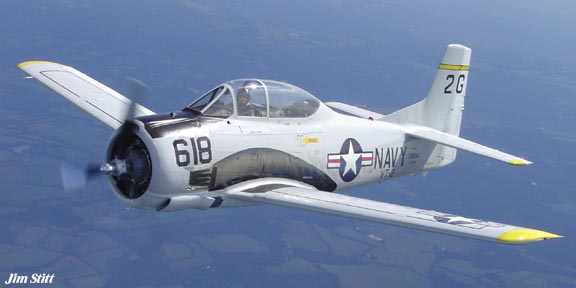WARBIRD REGISTRY > T-28 TROJAN REGISTRY > PREVIOUS PAGE
SPECIFICATIONS

|
GENERAL INFO: Type: Two-Seat Trainer Origin: North American Aviation Models: T-28A, T-28B, T-28C, T-28D, AT-28D, Fennec First Flight: September 24, 1949 |
Service Delivery: 1950 Final Delivery: 1957 Number Produced: 1,948 total T-28A: 1,194 T-28B: 489 T-28C: 299 |
|
POWERPLANT: T-28A Trojan: Model: Wright R-1300 Type: 9-Cylinder Radial Engine Number: One Horsepower: 800hp Propeller: 2 blade constant speed
T-28B & C Trojan:
T-28D Nomad:
Fennec: |
DIMENSIONS: T-28B Length: 32 ft 6 in Wingspan: 40 ft. 7 In. Height: 12 ft 7 in Wing area: 268 ft² (24.9 m²)
WEIGHTS: T-28B
PERFORMANCE: T-28B
ARMAMENT: T-28B |
The North American T-28 Trojan was a piston-engined military trainer aircraft used by the United States armed forces in the 1950s and into the early 1980s. The largest single concentration of this aircraft was employed by the U.S. Navy at NAS Whiting Field in Milton, Florida in the training of student naval aviators. The last U.S. Navy training squadron to fly the T-28 was VT-27, based at NAS Corpus Cristi, Texas, flying the last T-28 training flight in early 1984. Many T-28s were subsequently sold to private civil operators, and due to their reasonable operating costs are often found flying as warbirds today.
DESIGN & DEVELOPMENT:
On September 24, 1949 the XT-28 (company designation NA-159) was flown for the first time, designed to replace the T-6 Texan. Found satisfactory, a contract was issued and between 1950 and 1957 a total of 1,948 were built. The T-28's service career ended by the introduction of the T-34 turboprop trainer.
OPERATIONAL USE:
Used primarily as a trainer for the majority of it's career, the Trojan found new life when used
in the COIN role.
T-28s saw extensive service during the Vietnam War in VNAF hands, as well as the Secret War in Laos. They were also supplied to Congo by the CIA to support Moise Tshombe's regime. France used locally remanufactured T-28s in close-support and patrol roles in Algeria (see below). In the Philippines, T-28s, known locally as "Tora-toras", figured prominently in a series of coup de etats in the 1980s and were employed as dive bombers by rebel military forces. The T-28 Trojan was the first US attack fixed wing aircraft (non-transport type) lost in SOUTH Vietnam, during the Vietnam War. Capt. Robert L. Simpson, USAF, Detachment 2A, lst Air Commando Group, and Lt. Hoa, SVNAF, were shot down by ground fire on 28 August 1962 while flying Close Air Support (CAS). Neither crewman survived. The USAF lost 23 T-28s to all causes during the war, with the last two losses occurring in 1968.
By 1958, the French Air Force was looking for a replacement for the aging T-6 Texans that they used in the ground attack role. They initially decided on the T-28B, however, all new T-28Bs being produced were allocated for the U.S. Navy. Fortunetly thier were 148 T-28As belonging to the USAF stored at Davis-Monthan AFB in AZ and the French arranged to acquire them. They removed the underpowered R-1300 and replaced it with the much more powerful R-1820-76A, reversed the throttle, and also added armor and several ordnance hardpoints. The majority of these modifications were accomplished by Sud Aviation in 1959. The result became known as the Fennec. The French Air Force used these aircraft in the Algerian war from 1960 to July 1962, when the war there ended. Post-war they were used to train reserve pilots until the reserves were disbanded in 1964.
VARIANTS:
XT-28 - Prototype, 2 built.
T-28A - US Air Force version with an Wright R-1300 Cyclone powerplant.
T-28B - US Navy version with Wright Cyclone R-1820 powerplant.
T-28C - US Navy version, a T-28B with tailhook for deck landing training.
T-28D Nomad - T-28As converted for the COIN role. Re-engined as per the T-28B and C, and fitted with six underwing hardpoints. Total 393 converted - 321 by NAA, plus 72 by Fairchild Hiller.
AT-28D - T-28Ds used for attack training by the USAF.
Fennec - Ex-USAF T-28As refurbished and modified by Sud-Aviation in France.
OPERATORS:
Argentine Navy, Bolivian Air Force, Brazilian Navy; Congolese Air Force, Cuban Air Force, Ecuadorian Air Force, Ethiopian Air Force, French Air Force, Honduran Air Force, Japanese Air Self-Defense Force, Royal Lao Air Force, Mexican Air Force, Royal Moroccan Air Force, Philippine Air Force, Republic of Korea Air Force, Vietnam Air Force , Royal Thai Air Force, United States Air Force, United States Navy, Uruguayan Navy.
www.t28.com; Wikipedia; National Museum Of The U.S. Air Force
WARBIRD REGISTRY > T-28 TROJAN REGISTRY > PREVIOUS PAGE
